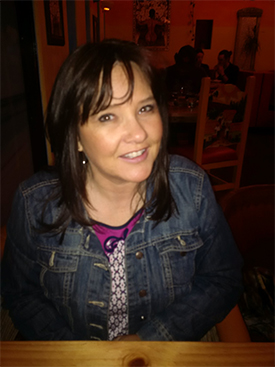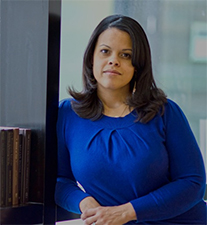Poetry to Prose and Back Again:
Cara-Lyn Morgan in Conversation
with Lisa Bird-Wilson

Malahat books reviewer and poet, Cara-Lyn Morgan, interviews Lisa Bird-Wilson about her short story, "Counselling," and poem, "City Slicker," as they appear in the Malahat's most recent issue, Indigenous Perspectives. "Counselling" was the recipient of the 2017 Jack Hodgins Founders' Award for Fiction.
Lisa Bird-Wilson is a Cree-Métis writer from Saskatoon. A finalist for the Danuta Gleed Award, her short-story collection, Just Pretending (2013) was named Book of the Year (Saskatchewan Book Awards).
In "Counselling," your ability to write an unreliable narrator without calling too obviously attention to her unreliability was done with such subtlety, we champion your speaker even though she tells us repeatedly and in a variety of ways that she cannot be trusted. In such a brief piece of writing, how were you able to still so convincingly develop this "anti-hero" type character while maintaining her charm, likability, and vulnerability? Can you talk a little about the role of trust and truth-telling when you are dealing with an unreliable narrative source?
First of all I'm glad to hear she's a sympathetic character, one who can be championed. I like your question because it forces me to reflect on a piece of writing and on the writing process. I honestly don't remember that I thought at all about this character being unreliable or untrustworthy. It would be destructive to the story to think about these things consciously in the writing stage. At least for me it would. If I thought about her character as unreliable I believe the story would show that by being too self-conscious. It would likely fall flat. Looking back on the story and the character, I think it's her vulnerability, and her belief in herself and her commitment to her actions, at least in the moment, that make her sympathetic. What she goes through is "truth" for her.
When your speaker begins describing the drunk-texting scene, the tension you were able to build and maintain was palpable despite the brevity of the scene. It was such a human, vulnerable moment that has become a familiar rite of passage for so many people. The "drunk-text" is a new reality of the instant communication era. Can you talk about electronic messaging as a new form of dialogue in writing? Do you use this method of speech as a tool often in your fiction and are you finding this evolution of speech to be an organic device, or something you have to work more consciously into your pieces?
Once I tried writing a story that included a lot of texting but I couldn't sustain it. But in small amounts I think it works in the contemporary setting because most people have a device and can relate. It's pretty organic to a story to have a character check her phone. I also think you can tell a contemporary story and not have people pull their phones out. I think readers accept their absence unless it's obvious (ie. car breakdown, why don't you just call someone?).
I notice that throughout "Counselling," the male characters are given names and yet the women in the story (including the storyteller herself) remain nameless. This is true as well of the speaker in your poem, "City Slicker." Tell me about the act of naming, and its importance to you. Can you speak about what the absence of names reveals not only about the speaker in "Counselling," but also about you as a writer and as a woman?
I didn't give it much thought but good observation. The character in "Counselling" is in first-person narrative and it seems forced to have her name herself—it didn't come up naturally and so I left it alone. Her refusal to know the name of the ex-wife is pretty true to her character and her particular insecurities. Sometimes names in a story are organic and sometimes they don't emerge naturally—it's one of the interesting things about being a writer—seeing what presents itself and seeing what needs coaxing. In this case, the character is very outward-looking, she's most interested in those around her, in knowing, experiencing, and perhaps "consuming" them. And yet underlying it all you come to realize that she harbours some great hurts.
Your poem, "City Slicker" tackles some very complicated and deep-seeded themes in a controlled and impactful way. Your use of quiet, both physically in the white space on the page and in the dark and snow and solitude of the scene, adds to a haunting quality that, like the ghosts in our lives, curls around us and feels at once safe and unnerving. Did you find it came naturally in your writing of this piece to impart broad conflicts of urbanization, sexuality, independence, solitude (among others) in such a concise and controlled way?
The poem grew out of part situation and part amalgamation of things I wanted to say and things I've heard said that resonate somehow. The form of the poem is pretty short and the various themes were natural to the "story" I was telling. I tend to naturally gravitate toward writing fiction, so for me poems often become really condensed little stories where I get the opportunity to pay close attention to each word choice, and also attend to structure, in a way that isn't practical in a longer prose piece. I love crafting a poem—it's very satisfying.
Your collection, The Red Files has a similar feeling to "City Slickers" overall, as if every word is working its hardest, to pack in a much bigger story while protecting the poems from feeling overburdened. In fact, the first (and I believe only) use of a curse word in your collection doesn't appear until page 62. When I came upon this word, it was like a gut-punch even though I am extremely familiar with its use. I noted this because it was a perfect example of your intentional and deliberate word choices throughout. Do you consider yourself a poet who spends a lot of time editing your work, or are your finished drafts often close to your earlier versions? I noted the same wonderful control and literary thoughtfulness in your short story as well, and I am curious as to whether you find your editing process similar as you move from poetry to prose and back again. Is that an easy transition for you as a writer?
That's a good description—the idea of protecting the poems from being overburdened. I edit my poems a great deal—maybe ten or twelve drafts. Maybe more in some cases, where it's not quite working out and takes that time to figure out the problem. As far as the story-poem editing comparison, I consider myself a short story writer first and foremost. I think what happens is that the poems tend to mimic that somehow. I have a "story" in mind, often, when I write a poem. Or at least an image of the story I want to convey. The editing of a poem though is rather joyous because so much time can be spent tightly focussed in on language. I truly enjoy that process.

Cara-Lyn Morgan
* * * * * * * *









